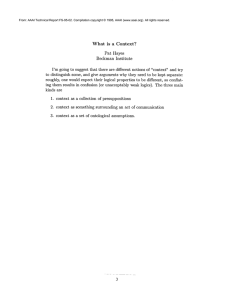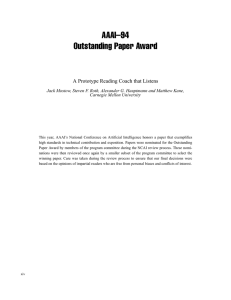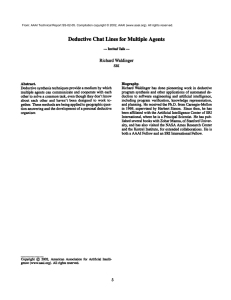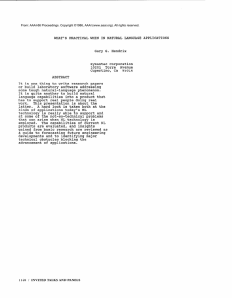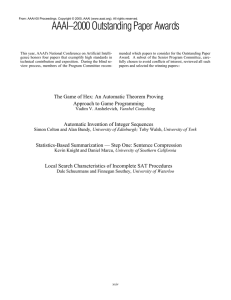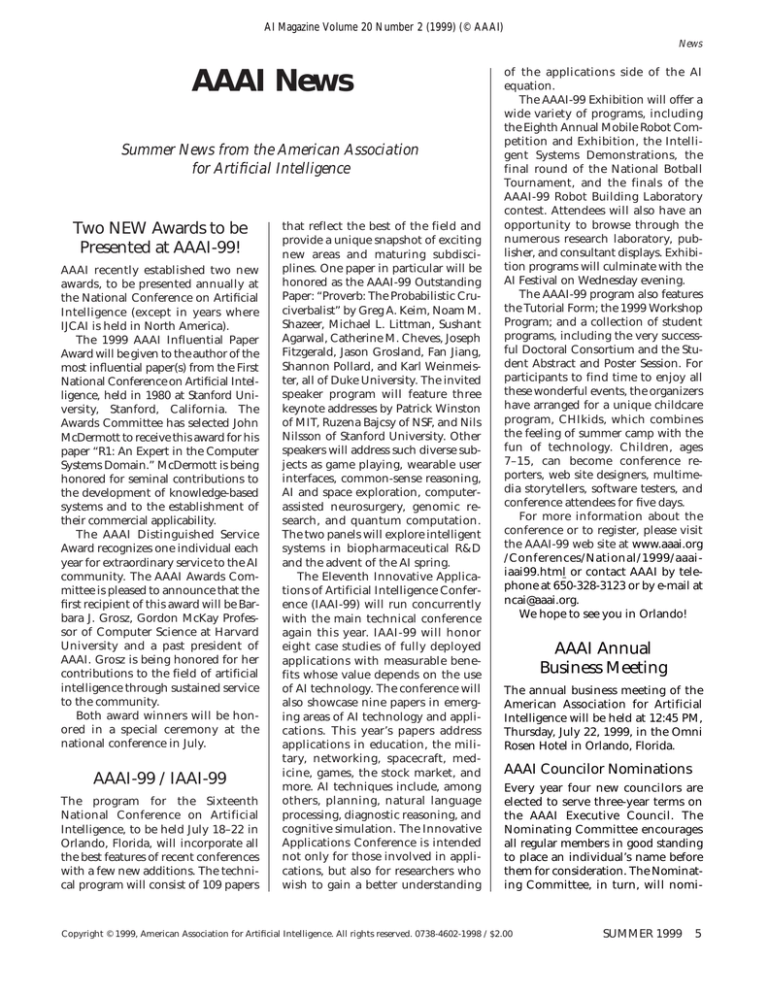
AI Magazine Volume 20 Number 2 (1999) (© AAAI)
News
AAAI News
Summer News from the American Association
for Artificial Intelligence
Two NEW Awards to be
Presented at AAAI-99!
AAAI recently established two new
awards, to be presented annually at
the National Conference on Artificial
Intelligence (except in years where
IJCAI is held in North America).
The 1999 AAAI Influential Paper
Award will be given to the author of the
most influential paper(s) from the First
National Conference on Artificial Intelligence, held in 1980 at Stanford University, Stanford, California. The
Awards Committee has selected John
McDermott to receive this award for his
paper “R1: An Expert in the Computer
Systems Domain.” McDermott is being
honored for seminal contributions to
the development of knowledge-based
systems and to the establishment of
their commercial applicability.
The AAAI Distinguished Service
Award recognizes one individual each
year for extraordinary service to the AI
community. The AAAI Awards Committee is pleased to announce that the
first recipient of this award will be Barbara J. Grosz, Gordon McKay Professor of Computer Science at Harvard
University and a past president of
AAAI. Grosz is being honored for her
contributions to the field of artificial
intelligence through sustained service
to the community.
Both award winners will be honored in a special ceremony at the
national conference in July.
AAAI-99 / IAAI-99
The program for the Sixteenth
National Conference on Artificial
Intelligence, to be held July 18–22 in
Orlando, Florida, will incorporate all
the best features of recent conferences
with a few new additions. The technical program will consist of 109 papers
that reflect the best of the field and
provide a unique snapshot of exciting
new areas and maturing subdisciplines. One paper in particular will be
honored as the AAAI-99 Outstanding
Paper: “Proverb: The Probabilistic Cruciverbalist” by Greg A. Keim, Noam M.
Shazeer, Michael L. Littman, Sushant
Agarwal, Catherine M. Cheves, Joseph
Fitzgerald, Jason Grosland, Fan Jiang,
Shannon Pollard, and Karl Weinmeister, all of Duke University. The invited
speaker program will feature three
keynote addresses by Patrick Winston
of MIT, Ruzena Bajcsy of NSF, and Nils
Nilsson of Stanford University. Other
speakers will address such diverse subjects as game playing, wearable user
interfaces, common-sense reasoning,
AI and space exploration, computerassisted neurosurgery, genomic research, and quantum computation.
The two panels will explore intelligent
systems in biopharmaceutical R&D
and the advent of the AI spring.
The Eleventh Innovative Applications of Artificial Intelligence Conference (IAAI-99) will run concurrently
with the main technical conference
again this year. IAAI-99 will honor
eight case studies of fully deployed
applications with measurable benefits whose value depends on the use
of AI technology. The conference will
also showcase nine papers in emerging areas of AI technology and applications. This year’s papers address
applications in education, the military, networking, spacecraft, medicine, games, the stock market, and
more. AI techniques include, among
others, planning, natural language
processing, diagnostic reasoning, and
cognitive simulation. The Innovative
Applications Conference is intended
not only for those involved in applications, but also for researchers who
wish to gain a better understanding
of the applications side of the AI
equation.
The AAAI-99 Exhibition will offer a
wide variety of programs, including
the Eighth Annual Mobile Robot Competition and Exhibition, the Intelligent Systems Demonstrations, the
final round of the National Botball
Tournament, and the finals of the
AAAI-99 Robot Building Laboratory
contest. Attendees will also have an
opportunity to browse through the
numerous research laboratory, publisher, and consultant displays. Exhibition programs will culminate with the
AI Festival on Wednesday evening.
The AAAI-99 program also features
the Tutorial Form; the 1999 Workshop
Program; and a collection of student
programs, including the very successful Doctoral Consortium and the Student Abstract and Poster Session. For
participants to find time to enjoy all
these wonderful events, the organizers
have arranged for a unique childcare
program, CHIkids, which combines
the feeling of summer camp with the
fun of technology. Children, ages
7–15, can become conference reporters, web site designers, multimedia storytellers, software testers, and
conference attendees for five days.
For more information about the
conference or to register, please visit
the AAAI-99 web site at www.aaai.org
/Conferences/National/1999/aaaiiaai99.html or contact AAAI by telephone at 650-328-3123 or by e-mail at
ncai@aaai.org.
We hope to see you in Orlando!
AAAI Annual
Business Meeting
The annual business meeting of the
American Association for Artificial
Intelligence will be held at 12:45 PM,
Thursday, July 22, 1999, in the Omni
Rosen Hotel in Orlando, Florida.
AAAI Councilor Nominations
Every year four new councilors are
elected to serve three-year terms on
the AAAI Executive Council. The
Nominating Committee encourages
all regular members in good standing
to place an individual’s name before
them for consideration. The Nominating Committee, in turn, will nomi-
Copyright © 1999, American Association for Artificial Intelligence. All rights reserved. 0738-4602-1998 / $2.00
SUMMER 1999
5
News
nate eight candidates for councilor in
the spring. In addition to members’
recommendations, the committee will
actively recruit individuals in order to
provide a balanced slate of candidates.
AAAI members will vote in the late
spring of 2000.
To submit a candidate’s names for
consideration, please send the individual’s name, address, phone number,
and e-mail address to Carol Hamilton,
Executive Director, AAAI, 445 Burgess
Drive, Menlo Park, CA 94025; by fax
to 650/321-4457; or by e-mail to
hamilton@aaai.org.
Nominators
should contact candidates prior to
submitting their names to verify that
they are willing to serve, should they
be elected. The deadline for nominations in November 1, 1999.
1999 AAAI Fall
Symposium Series
The 1999 AAAI Fall Symposium Series
will be held Friday through Sunday,
November 5–7, 1999, at the Sea Crest
Resort & Conference Center in North
Falmouth, Massachusetts. The topics
of the five symposia in the 1999 Fall
Symposia Series are:
■ Modal and Temporal Logics Based Planning for Open Networked Multimedia
Systems. Chair: Fawzi Daoud (daoud@
cs.toronto.edu)
■ Narrative Intelligence. Cochairs: Michael
Mateas (michaelm@cs.cmu.edu) and
Phoebe Sengers (phoebe@ zkm.de)
■ Psychological Models of Communication in Collaborative Systems. Cochairs:
Susan Brennan (susan.brennan@sunysb.edu) and Alain Giboin (Alain.Giboin
@sophia.inria.fr)
■ Question Answering Systems. Cochairs:
Vinay K. Chaudhri (chaudhri@ai.sri.
com) and Richard Fikes (fikes@hpp.
stanford.edu)
■ Using Layout for the Generation, Understanding or Retrieval of Documents.
Cochairs: Richard Power (richard.power@itri.bton.ac.uk) and Donia Scott
(Donia.Scott@itri.brighton.ac.uk)
Symposia will be limited to
between forty and sixty participants
each. In addition to invited participants, a limited number of other interested parties will be able to register in
each symposium on a first-come, firstserved basis. Complete registration
and hotel information will be avail-
6
AI MAGAZINE
able in July by request from fss@
aaai.org or on the AAAI web site at
www.aaai.org/Symposia/symposia.
html. Invited participants must register by September 8, and the final registration deadline is September 22. The
deadline for hotel reservations at the
Sea Crest Resort is October 4, 1999.
The discounted single/double room
rate of $79.00 per night might not be
available after this date. Please call the
Sea Crest at 1- 800-225-3110 or 1-508540-9400 for reservations, and be sure
to identify yourself as an attendee at
the American Association for Artificial
Intelligence Fall Symposium Series.
2000 Spring
Symposium Series
The 2000 Spring Symposium Series
will be held March 20–22, 2000, at
Stanford University. The Call for Participation will be available in July on
the AAAI web site (www.aaai.org/Symposia/symposia.html) and will be
mailed to all AAAI members. The tentative list of topics is as follows:
■ Adaptive User Interfaces. Cochairs: Seth
Rogers (rogers@rtna.daimlerchrysler.
com) and Wayne Iba
■ Artificial Intelligence and Interactive
Entertainment. Chair: Wolff Dobson
(wolff @cs.nwu.edu)
■ Bringing Knowledge to Business Processes. Cochairs: Steffan Staab (staab@aifb
.uni-karlsruhe.de) and Dan O’Leary
(oleary @rcf.usc.edu)
■ My Dinner with R2D2: Natural Dialogues with Practical Robotic Devices.
Chair: Susann Luperfoy (luperfoy@iet.
com)
■ Real-Time Autonomous Systems. Chair:
David Musliner (musliner@htc.honeywell.com)
■ Smart Graphics. Chair: Andreas Butz
(butz @cs.uni-sb.de)
AAAI-2000
AAAI is pleased to announce that the
Seventeenth National Conference on
Artificial Intelligence (AAAI-2000) and
the Twelfth Innovative Applications of
Artificial Intelligence Program (IAAI2000) will be held in Austin, Texas
from July 30–August 3, 2000. The
AAAI-2000 Call for Participation will
be published this summer and will be
available on the AAAI web site at
www.aaai.org. The program cochairs for
AAAI-2000 are Henry Kautz, AT&T
Labs—Research (kautz@research.att. com)
and Bruce Porter, University of Texas at
Austin (porter@cs.utexas. edu). For further
information, please contact AAAI at
650/328-3123 or by e-mail at ncai@aaai.
org.
IJCAI Award for
Research Excellence
The IJCAI Award for Research Excellence
is given at the IJCAI conference to a scientist who has carried out a program of
research of consistently high quality,
yielding several substantial results. The
winner of the 1999 IJCAI Award for
Research Excellence is Judea Pearl, professor at the Computer Science Department
of the University of California, Los Angeles, USA. Pearl is recognized for his fundamental work on heuristic search, reasoning under uncertainty, and causality. He
will deliver a lecture entitled “Reasoning
with Cause and Effect” the evening of
August 5, 1999.
IJCAI Computers and
Thought Award
The Computers and Thought Award is
presented at IJCAI conferences to outstanding young scientists in artificial
intelligence. The award was established
with royalties received from the book
“Computers and Thought,” edited by
Edward Feigenbaum and Julian Feldman;
it is currently supported by income from
IJCAII funds. The winner of the 1999
IJCAI Computers and Thought Award is
Nicholas R. Jennings, professor in the
Department of Electronic Engineering at
the Queen Mary and Westfield College,
University of London, UK. Jennings is recognized for his contributions to practical
agent architectures and his applied work
in the field of multiagent systems. He will
deliver a lecture entitled “Agent-Based
Computing: Promise and Perils” the
evening of August 3, 1999.
The Donald E. Walker Distinguished Service Award
The IJCAI Distinguished Service Award
was established in 1979 by the IJCAII
trustees to honor senior scientists in AI for
News
Congratulations to the
1999 AAAI Fellows!
E
ach year a small number of fellows are recognized for their unusual distinction in the profession and for their sustained contributions to the
field for a decade or more. An official dinner and ceremony will be held
in their honor at AAAI-99 in Orlando, Florida.
Harry G. Barrow
Schlumberger Cambridge Research
For seminal contributions towards understanding the computational nature of vision in humans and machines.
James A. Hendler
University of Maryland and DARPA/ISO
For significant contributions to the fields of planning, knowledge representation, and high performance artificial intelligence.
Daniel S. Weld
University of Washington
For significant contributions to the development of qualitative
reasoning methods, software agent technology, and plan synthesis algorithms.
contributions and service to the field
during their careers. In 1994, the IJCAI
Distinguished Service Award was
renamed the Donald E. Walker Distinguished Service Award in memory of
the late Donald E. Walker, who shaped
the IJCAII organization as a secretarytreasurer.
At IJCAI-99, the Donald E. Walker
Distinguished Service Award will be
given to Wolfgang Bibel, professor for
Intellectics in the Department of
Computer Science of the Darmstadt
Institute of Technology in Germany.
As a pioneering researcher in automated deduction, Bibel is recognized for
his outstanding contributions and service to the international AI community including his creation of ECCAI,
which has operated since 1982 as an
umbrella organization of 27 European
societies for artificial intelligence.
AAAI Member News
Tom M. Mitchell, Carnegie Mellon
University professor of computer science and robotics, and director of the
Center for Automated Learning and
Discovery (CALD) in the School of
Computer Science (SCS), has been
named the Fredkin Professor of Artificial Intelligence and Learning in SCS.
The Fredkin professorship is being
established to honor entrepreneur and
philanthropist Edward Fredkin, a pioneer in artificial intelligence and
robotics. Mitchell is best known for his
work on machine learning, where he
has developed algorithms that allow
computers to automatically improve
with experience, software that learns
to customize to its users, robots that
automatically learn about their environment, and web browsers that learn
to extract information from hypertext.
He is the author of the widely used
textbook Machine Learning. Mitchell
received the IJCAI “Computers and
Thought Award” in 1983, has been a
AAAI fellow since 1990, and has been
a member of the National Research
Council Computer Science and
Telecommunications Board since
1998.
SUMMER 1999
7
News
Independent
Auditor’s Report
Robert H. Burnham, CPA
March 15, 1999
The Board of Directors
American Association For Artificial Intelligence
Menlo Park, California
We have audited the statement of financial position of American Association for Artificial Intelligence as of December 31,
1998 and the related statements of activities, changes in net
assets and cash flows for the year then ended. These financial
statements are the responsibility of the Association’s management. Our responsibility is to express an opinion on these
financial statements based on our audits.
We conducted our audits in accordance with generally accepted
auditing standards. Those standards require that we plan and
perform the audit to obtain reasonable assurance about whether
the financial statements are free of material misstatement. An
audit includes examining, on a test basis, evidence supporting
the amounts and disclosures in the financial statements. An
audit also includes assessing the accounting principles used and
significant estimates made by management, as well as evaluating the overall financial statement presentation. We believe
that our audits provide a reasonable basis for our opinion.
In our opinion, the financial statements referred to above present fairly, in all material respects, the financial position of
American Association for Artificial Intelligence as of December
31, 1998 and the results of operations and cash flows for the
year then ended, in conformity with generally accepted
accounting principles.
8
AI MAGAZINE
Notes to
Financial Statements
December 31, 1998
Note 1. Summary of Significan
Accounting Policies
A.Method of Accounting
The financial statements are presented on the accrual basis of accounting.
Effective for 1996 the Association
has changed its method of accounting
for investments from “original cost”
to “fair market value” as required by
the provisions of Statement of Financial Accounting Standards No. 124.
The cumulative effect of the change
in accounting principle from prior
years was shown as an extraordinary
item on the statement of Activities for
the year ended December 31, 1996.
Since investments are stated at fair
market value realized and unrealized
gains and losses are combined on the
statement of activities where in years
prior to 1996 only realized gains and
losses were shown.
B. Inventory
Magazine, proceedings, conference
books and publications in process
inventory is valued at the lower of
cost or market value as of December
31, 1998.
C. Furniture, Fixtures and
Equipment
Furniture, fixtures and equipment are
stated at cost, less accumulated depreciation. Depreciation is computed on
the straight-line method over estimated useful lives of five to ten years. Furniture, fixtures and equipment consist
of the following at December 31, 1998.
Cost
$ 148,196
Accumulated depreciation (100,237)
Net
$ 47,959
D. Income Taxes
American Association for Artificial
Intelligence is exempt from income
taxes on its earning from investments
and its exempt function operations
under Section 501(c)(3) of the Internal Revenue Code and Section
23701(d) of the California Revenue
and Taxation Code. Federal and California taxes were paid during 1998 on
earnings from sales of mailing lists
and advertising.
News
STATEMENT OF FINANCIAL POSITION
DECEMBER 31, 1998
PRELIMINARY CALL FOR PAPERS
Assets
Current Assets:
Cash & Equivalents
Investments—Stated at Fair Market Value (Note 1A & 3)
Accounts Receivable—Trade
Inventory
Prepaid Expenses and Advances
Prepaid Expenses - Future Events
TOTAL CURRENT ASSETS
Furniture, Fixtures, and Equipment, Net (Note 1-C)
Deposits
$ 560,719
11,292,294
13,930
248,916
12,944
26,745
12,155,548
47,959
5,279
$12,208,786
Breckenridge, CO, USA
April 12-15, 2000
Colocated with AIPS 2000
Liabilities and Net Assets
Current Liabilities:
Accounts Payable and Accrued Expenses
Unearned Membership Fees (Note 4)
TOTAL CURRENT LIABILITIES
Net Assets—Unrestricted
$ 37,569
217,686
255,255
11,953,531
$12,208,786
STATEMENT OF CASH FLOWS
FOR THE YEAR ENDED DECEMBER 31, 1998
Cash Flows From Operating Activities:
Net Increase in Net Assets
Adjustments to Reconcile Change in Net Assets to
Net Cash Flows from Operations:
Depreciation Expense
Net Decrease in Accounts Receivable
Net Decrease in Inventory
Net Decrease in Prepaid Expenses
Net Decrease in Accounts Payable
Net Decrease in Unearned Membership Fees
Net Decrease in Unearned Revenue
Net Unrealized and Realized Gains on Investments
Net Cash Flows from Operating Activities
$1,347,902
26,445
5,051
25,136
49,265
(28,198)
(8,428)
(11,762)
(1,735,559)
(330,148)
Cash Flow From Investing Activities:
Purchase of Furnishings and Equipment
Sale of Investments, Net of Purchases of Investments
Net Cash Flow from Investing Activities
Net Increase in Cash and Equivalents
Cash and Equivalents—January 1, 1998
Cash and Equivalents—December 31, 1998
Seventh
International
Conference on
Principles of
Knowledge
Representation
and Reasoning
(KR2000)
(32,333)
607,504
575,171
245,023
315,696
$ 560,719
KR2000 will present papers that present
substantial new results in the principles
of KR&R systems while clearly showing
the applicability of those results to implemented or implementable AI systems.
KR2000 will colocate with AIPS2000,
with a joint day. Papers of interest to both
communities are strongly encouraged.
Associated workshops can occur both
before or after KR2000.
The Program Committee will review
extended abstracts of at most twelve
LaTeX article-style pages, excluding the
title page and the bibliography. Five
copies of extended abstracts must be sent
one of the program chairs by Tuesday
November 2, 1999. An electronic form
giving information on the paper must
also be submitted by October 22, 1999.
For more details see the KR2000 web
page at www.kr.org/ kr/kr00.
Program Cochairs
Fausto Giunchiglia
Aut. Reasoning Systems Div.
ITC-IRST
Povo, 38050 Trento, Italy
fausto@irst.itc.it
Bart Selman
Computer Science Dept.
Cornell University
Ithaca, NY 14853-7501, USA
selman@cs.cornell.edu
SUMMER 1999
9
News
STATEMENT OF ACTIVITIES AND CHANGES IN NET ASSETS
FOR THE YEAR ENDED DECEMBER 31, 1998
Changes in Net Assets: Gross Profit (Loss), By Activity:
AI Magazine Revenue (Note 4)
$ 10,893
AI Magazine Expenses
(183,562)
Memberships Revenue (Note 4)
308,637
Memberships Expenses
(126,976)
AAAI Press Revenue
275,210
AAAI Press Cost of Sales
(194,632)
Spring Symposium ’98 Revenue
75,435
Symposium Expenses
(62,327)
Fall Symposium ’98 Revenue
40,200
Symposium Expenses
(74,882)
Conference on Knowledge Discovery
and Data Mining Revenue
295,525
Conference Expenses
(240,655)
AAAI ’98 Revenue
337,592
AAAI ’98 Expenses
(397,205)
’98 Tutorials Revenue
45,230
Tutorials Expenses
(61,535)
’98 Exhibits Revenue
117,541
Exhibits Expenses
(128,072)
Prior Year Events Expenses
Royalty Income and Reprint Permissions
Interest and Dividend Income
Realized and Unrealized Gains on Investments (Note 1A)
Investment Management Fees
Grants & Scholarships Expended
Miscellaneous
Gross Profit, Combined
Operating Expenses
Net Increase in Net Assets
Net Assets—January 1, 1998
Net Assets—December 31, 1998
$ (172,669)
181,661
80,578
13,108
(34,682)
54,870
Note 4. Memberships
Annual membership in the American
Association for Artificial Intelligence
is $50 for individuals, $20 for student
members, and $75 for library subscriptions. Twenty five dollars is
added to the above for other than U.S.
and Canadian members. Three, five
year, and lifetime memberships are
also available. All Revenue from
memberships is included in the AI
Memberships gross profit center. Revenues from membership fees are
earned ratably over the respective
membership period. Lifetime membership fees are recognized as income
over ten years.
Note 5. Pension Benefits
(59,613)
(16,305)
(10,531)
(10,045)
2,508
355,323
1,735,559
(122,702)
(254,175)
449
1,743,334
(395,432)
1,347,902
10,605,629
$11,953,531
Prior to 1998 American Association
for Artificial Intelligence sponsored a
pension plan under Section 403 (B) of
the Internal Revenue Code allowing
employee contributions to their own
individual accounts. Beginning in
1998 the plan expanded benefits to
include company contributions to
their individual accounts of five percent of their salaries for regular, fulltime employees who have worked a
minimum of three years at AAAI. In
addition, AAAI will match employees’
contributions up to five percent of
their salaries for regular, full-time
employees who have worked a minimum of five years at AAAI.
Note 2. Operations
Note 3. Investments at December 31, 1998
AAAI was formed in 1979 as a scientific
society, to encourage the basic knowledge
of what constitutes intelligent thought
and behavior and how it can be exhibited
in computers. This is accomplished by
the AI Magazine, the publications of the
AAAI Press, the National Conference on
Artificial Intelligence (NCAI), the Conference on Innovative Applications of Artificial Intelligence (IAAI), the International
Conference on Knowledge Discovery and
Data Mining, the Mobile Robot Competition, the Symposium Series, and the AAAI
Workshop Program. In addition, AAAI
has an extensive program for student
scholarships, women and minority
grants, and sponsorship of independent
workshops and conferences. Finally,
AAAI’s World Wide Web Site serves as a
central resource for individuals involved
in AI research.
Investments are stated at fair market value since it is readily determinable and the
investments are not necessarily being held to any maturity. Realized and unrealized gains and losses are reported in the statement of activities.
Investment activity for 1998 is as follows:
Investments—Beginning of year (At fair market value)
$ 10,164,239
Unrealized & Realized gains
1,735,559
Interest & Dividends
331,832
Total Return On Investments
2,067,391
Purchases of Investments
4,240,922
Sales of Investments
(4,848,426)
Interest & Dividends deposited to Cash & Equivalents
(331,832)
Investments—End of Year
$11,292,294
10
AI MAGAZINE
Investments consist of the following at 12-31-98:
U.S. Treasury Notes/Govt Agency Notes
U.S. Guaranteed Mortgages
Corporate Fixed Income
Common/Preferred Stocks
$ 1,686,120
55,046
1,563,774
7,987,354
Total Investments—Unrestricted
$11,292,294

